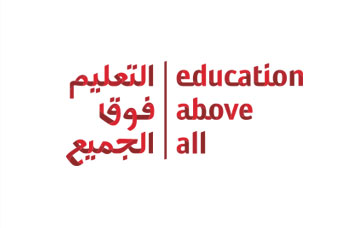CPO Content Area
Her Highness Sheikha Moza is driven by her passion for education and her belief in its ability to enhance opportunities and transform societies. She is committed to ensuring that every child has access to a quality education and can go to school in a safe environment.
In support of her United Nations roles and her commitment to the universal right to education, Sheikha Moza has set up a number of international programmes that protect and promote access to schooling.
In 2012, Her Highness launched the Education Above All Foundation (EAA), bringing all her international programmes under one umbrella, including Al-Fakhoora, Educate A Child, PEIC (Protect Education in Insecurity and Conflict) and ROTA (Reach Out To Asia). The foundation’s programmes work to ensure that all children in the developing world – particularly the 59 million who are currently out of school – will be able to realise their right to education. Through capacity-building, resource mobilisation, and multi-sectoral partnerships and alliances, EAA addresses educational issues with a special commitment to the most underserved populations of the world.
Educate A Child is working with a broad range of international, national and local partners to reach the world’s poorest and most marginalised out of school children. Its focus is on nurturing innovative approaches to reach these children, and on replicating and scaling-up successful programmes. The programme is currently providing opportunites for over 10 million children.
Sheikha Moza is committed to defending the right to education in areas of conflict and views education as a crucial building block in helping societies recover from hostilities. To this end, Sheikha Moza launched Al Fakhoora in 2009 to provide education opportunities to students in Gaza, despite the difficulties that face them and their families. Al Fakhoora has a scholarship programme that supports thousands of university students each year to pursue higher education. In addition, the organisation has helped to rebuild educational institutions and supports health and well-being services for families. Since 2016 the programme has expanded to six new regions to support Palestinians in the West Bank, and Syrian IDPs and refugees in Syria, Turkey, Lebanon, Jordan, and Iraq.
In conflict-affected areas, long after the fighting stops, an education system in tatters will severely stunt a nation’s capacity to rebuild. Sheikha Moza founded Protect Education in Insecurity and Conflict (PEIC) in 2009. PEIC promotes and protects the right to education in areas affected by crisis, conflict and insecurity. It is a policy, research and advocacy programme, which brings together practitioners and specialists in education, international law and child protection.
In 2010, supported by His Highness the Father Emir and Sheikha Moza, the State of Qatar introduced a resolution on “The Right to Education in Emergency Situations” at the UN General Assembly. The resolution, which the General Assembly unanimously adopted, affirms the human right to education and access to it during crisis and conflict and urges states to support this right as an integral element of humanitarian assistance and response. It further urges states to fulfill their obligations under international law to respect civilians and civilian objects and to not attack teachers, students, and education facilities.
In June 2011, Sheikha Moza met with Security Council members to advocate for the protection of education from attack. This contributed to the formulation of Secuirty Council Resolution 1998, adopted in July 2011, which makes attacks on schools and hospitals a “trigger violation” for the UN’s Monitoring and Reporting Mechanism for Children and Armed Conflict—a violation on the basis of which armed forces or groups can be added to the UN Secretary General’s “list of shame” and penalised accordingly.
In 2019, during the Social Forum of the Human Rights Council in Geneva, Sheikha Moza called for the establishment of an International Day to garner global advocacy for protection of education from attacks and to ensure accountability for the continued, deliberate attacks on education and the prevalent armed violence experienced by children worldwide. Spearheaded by the State of Qatar, the General Assembly resolution no. 74/275 was unanimously adopted, establishing 9 September as the International Day to protect Education from Attack.



